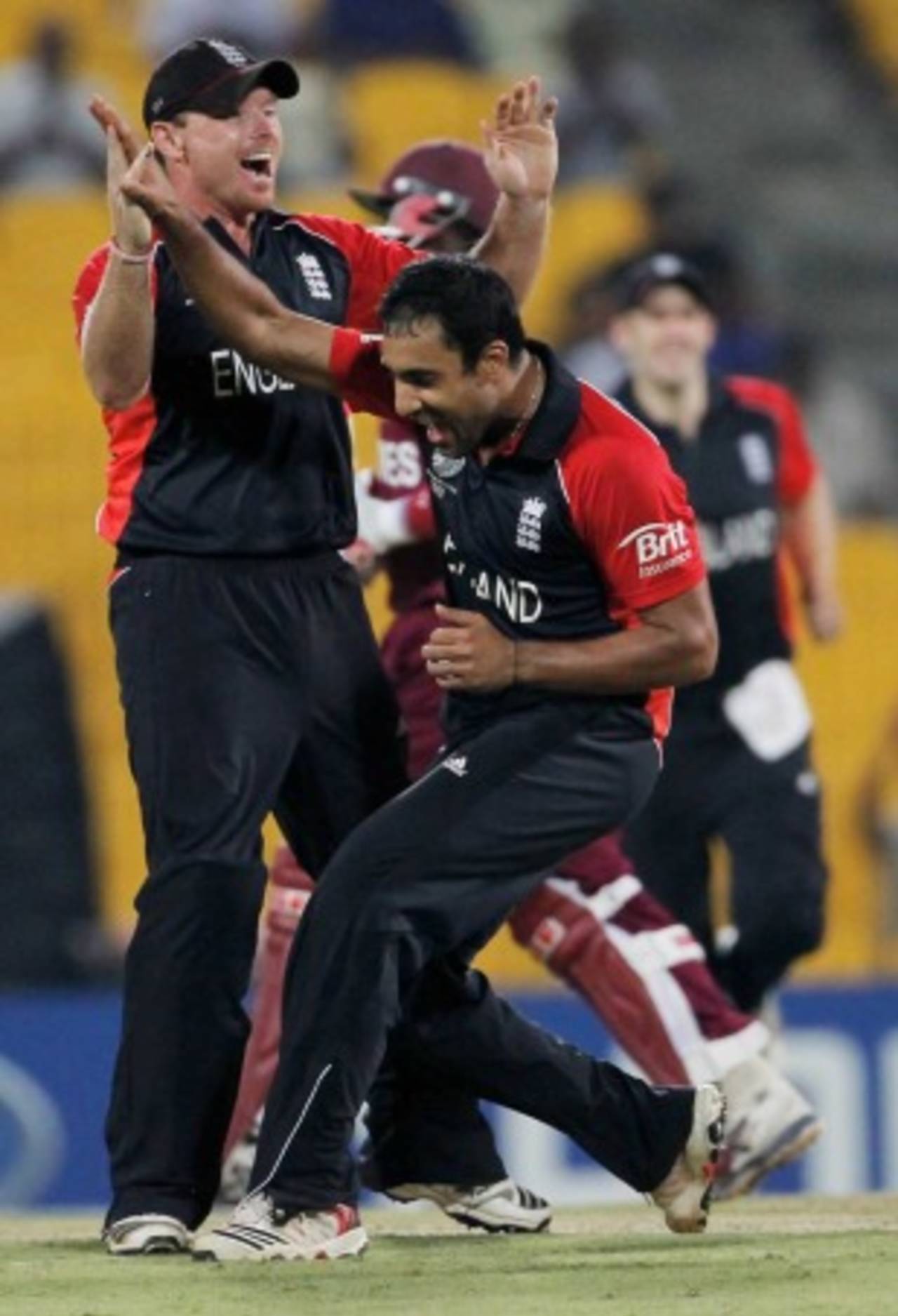England are still alive in the World Cup, and just as well.
Schizophrenic and never short of thrills, they have been the life of
this tournament. Fittingly, they produced another flawed performance, yet inspirational and resilient, to ensure that they won't be
boarding the flight home tomorrow morning. They have spent an eternity on the road so far this winter, but not having them at the business end of the tournament would just not be right. The World Cup needs them nearly as much as they need it.
If anything, England have displayed a near-miraculous ability to
calibrate their game to the relative strengths of their opponents. But
today they found an opponent more truant than them, and just as
England had blown their previous match as much as Bangladesh had won it, today the West Indians lost it as much as England snatched it from them.
Ottis Gibson, the West Indies coach, and a vital member of the English
troupe not so long ago, spoke almost enviously about the resilience in
the opposition camp which kept them in the quarter-final reckoning. The 18-run margin may look huge in a relatively low-scoring game, but on the field, it was almost as tight as Jonathan's Trott's disputed catch on the long-on boundary - a massive moment which was, after inconclusive replays, called a six.
That was the sort of moment that could have crushed England. West Indies were less than 40 runs away from their target with Ramnaresh Sarwan and
Andre Russell, playing only in his second ODI and batting like a braveheart, having added 54 for the seventh wicket. Russell's dismissal would have left them 204 for 7 with no more batting to follow. Instead they jumped to 210 for 6. With a catch having gone down in the outfield earlier, England would have been excused for imagining divine injustice.
But instead they regrouped. The field closed in. One more man was
brought in to the circle.
James Tredwell, a county veteran but World
Cup rookie, who had kept England in the game with three wickets in his first four overs, replaced Graeme Swann and produced a tight over that yielded only a run. Ravi Bopara then chugged through another tidy over that was only ruined by a fortuitous squeeze from Sarwan that ran away to third man for four. But clearly the incident of that catch seemed to have unnerved the West Indians more than the English.
Till then, the West Indian batsmen had played boldly and
adventurously; more adventurously perhaps than the occasion demanded. It looked fitful and desperate, but it was working. Nine sixes had been clouted, and Russell alone had hit three, each a clean blow over the straight field. But suddenly, with the knowledge that victory, now in their grasp, could have slipped with that catch on the boundary,
they grew fidgety and edgy. And England had the men to prey on their
nerves.
With four balls remaining in his tenth over, Tredwell went round the wicket to pin Russell on the crease. And back for his final over, Swann got a ball kick up to Sarwan and a forward short-leg had been posted to accept the inside-edge. Sulieman Benn survived a close lbw, but Kemar Roach went to a feeble loft to mid-off, and finally, Benn charged down for a desperate second to be run out by a yard.
By then England had already recovered from a middle-order collapse of 4 for 40 to post a score that could be defended, before weathering an early blitz from Chris Gayle, who clubbed the quick bowlers so ferociously that England, who opened with Swann, had spin at both ends by the seventh over.
But the moves that would prove decisive were made before the toss. In
some ways, England's hands were forced by circumstance, having lost first Stuart Broad and then Ajmal Shahzad to injury. But instead of trusting the experience of James Anderson and Paul Collingwood
England plumped for Tredwell and Luke Wright. It was a gamble
because as Andrew Strauss admitted, as composed on the field as he is before the cameras, the new players may have come in mentally fresh, but they also did so without match practice, and in Tredwell's case, not a single wicket at ODI level.
But as was the case with
Devendra Bishoo, the little Guyanese legspinner whom West Indies chose to blood, this was a match for the outsiders. Wright, who has spent most of his time in this World Cup as a substitute fielder, played perhaps the most important role of his stop-start international career to save the English innings from imploding. The West Indians made it easier for him by switching to their lesser bowlers when England were under the cosh, and by dropping their intensity on the field, but Wright batted intelligently, building gradually and then taking boundaries when opportunities came to swing his arms.
England haven't been the best team in the World Cup. In fact, a
theoretical chance still exists - if Bangladesh beat South Africa and
West Indies bounce back to beat India - that they could still be eliminated before the quarter-finals. But unlike some of the more fancied teams in this tournament, they are yet to lose to a top side, and with Bangladesh and Ireland out of their way, who knows how far they can go.
But for the moment, let's be grateful that they are still there,
keeping the World Cup throbbing and turning. Are they really the new
Pakistan, as Swann suggested immediately after the win? Who would have ever said that about an English side?
Sambit Bal is the editor of ESPNcricinfo
